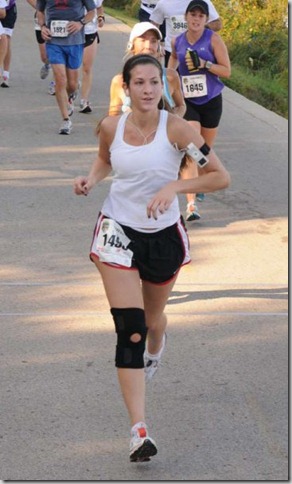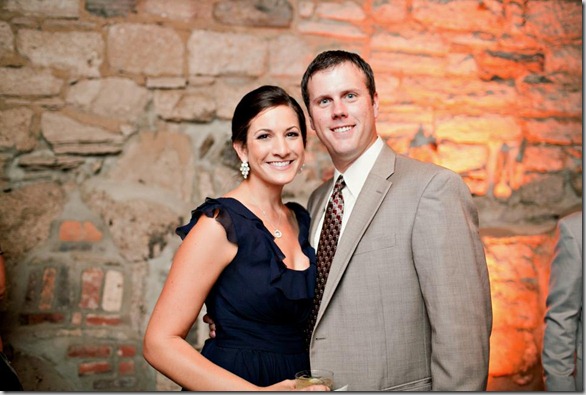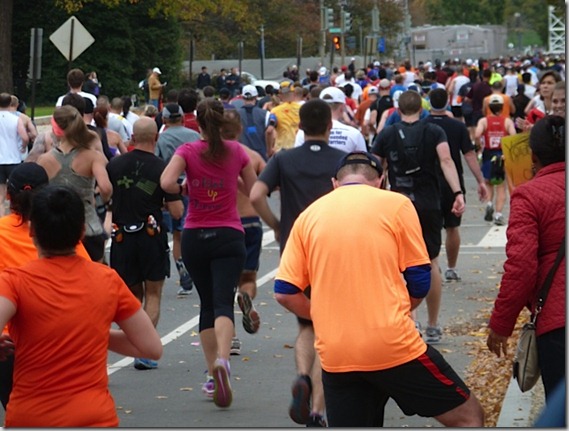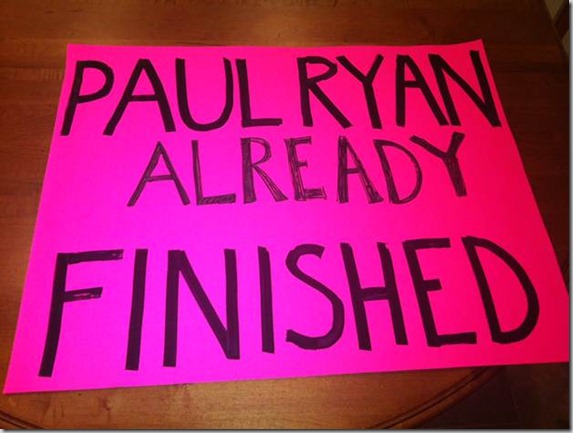Kristin here, known as Mrs. Miller and teacher by day, wife runner and puppy mommy by night.

I’m a two time marathoner, five time half marathoner, and lover of all things running. When Ashley asked me to post on Marathon+Moderation, I immediately knew what I wanted to write about: when good races go bad. To be more specific, when you enter the Runner’s Wilderness during a race.
I’ve experienced everything when it comes to a nightmare race day. I ran the More! Fitness Magazine women’s Half Marathon in 2009, which was turned into a fun run. Why? Because of a fluke 85 degree day. In April. It was dangerous, but I hydrated often and finished the race in about 2:15-2:18 (these were my pre Garmin days…amateur hour!)
I experienced bronchitis during my second half marathon, the 2009 Hamptons Half. I had just been diagnosed a day before, still had a fever and a hacking cough, but I lowered my expectations and finished the race in 2:29:44. (Not very smart running the race sick, but hey, it’s a pricey race!)
I experienced races that have gone well despite lack of training. My next two half marathons, the 13.1 NYC in 2010 and 2011, I had a cold for two weeks leading up to the races. Both times I did well, including running my current half marathon PR 2:06.
I experienced a perfect marathon in 2011. I ran the NYC marathon, my first, with ease. Despite a stomach flu and a cold during training, I never hit the wall and finished in 5:10:38 with the largest smile on my face. I recovered well, barely sore, happy with my accomplishment.

I experienced coaching a friend through her first half marathon. We ran the 13.1 NYC together. My friend struggled significantly at the end. As we walked, I’d set up landmarks and say "Once we reach that, we’ll run again." We finished in 2:29, and I couldn’t have been more proud.

Despite finishing races, there will always be some where its a true labor of love. Those races where you look back and think, "What the heck just happened?" And not in a good way. During the Philadelphia marathon on November 18, 2012, I experienced one of those races. Although I faced a nightmare getting there (you know, that little thing about the NYC marathon being cancelled? Oh, and I left my Garmin at my parent’s house….gasp!), I could not have been happier. Everything was in place; perfect weather, a great friend to run with, support from the best cheer squad around, a "flat fast course", and a shiny new pr within grasp. I set my goal to run a 4:45; lofty but completely doable based on my training runs. Then, the race happened. Up until mile 15 I was confident, then my confidence faded.
I went to a dark place, a place where many runners should avoid going to at all costs. A place where words like "can’t" and "won’t" and "quit" try to permeate your psyche. A place where tears are ever present, where walk breaks become inevitable. I call this the Runner’s Wilderness. Despite being in this place, there is a way out. Here are my tips for getting to the Promised Land: The Finish Line.
1. Remove detrimental words from your mind. If you are struggling in a race which was supposed to be a big race for you, it’s all but certain that self doubt will creep in like a nasty flu. What you need to do is speak to yourself, and if necessary, speak words of encouragement to other runners. The mantras I used during my time in the Runner’s Wilderness included "You are a Finisher" and "You can do it and you WILL do it."
2. Pump up the jams. The power of music is incredible. I reverted back to my first marathon mix because the songs had meaning for me and reminded me of a successful race. I channeled energy from Pink, Kings Of Leon, Rihanna, Kanye, Drake, Chris Brown, amongst many others. Their pumped up music pumped up my spirit.
3. Set perimeters when your dream race comes to a bump in the road. You have to make a plan to make finishing a reality. During the Philadelphia Marathon, I chose to walk 30 seconds at the start of each mile and 30 seconds during that mile if I absolutely needed it. with little breaks, the run seemed doable. I was reminded of an old bible verse: When you’ve done everything to stand, stand. I thought of it in my Runner’s Wilderness. When you’ve done everything to run, RUN. Do everything you can to run, whether it be a set walk break, a set stretch break, or a sprint and slow down pace. Make a plan that will help you become a finisher.

4. Enjoy the Promised Land. As I finished, with my husband by my side and friends cheering my name, the words softly playing in my headphones "if you can’t hold on…hold on…." I almost forgot to relish in the joy of the Promised Land: the finish line. In your last half mile, plant a smile on your face that no one can take away. It may be a smile drenched in tears, or it may be forced, but smile anyway. You’re finishing. You’re coming to the Promised Land. Forget the bad race, forget your time, you’re finishing what you set out to do. You’re becoming a finisher. It may be your first race, or it may be your tenth race; number and distance make no difference. You’ve fought hard, now finish your race on your terms. With joy. With excitement. With happiness.

In the end, by sticking to these steps, i ended up with a two minute PR and a second marathon medal. It wasn’t my dream race, but it was a race I finished. So, if you find yourself suffering during what was supposed to be your "best race yet", follow these steps to run from the Runner’s Wilderness and finish in the Promised Land.







